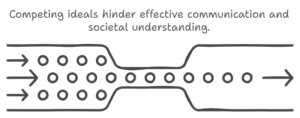Womb-to-Tomb Surveillance
The work of Marshall McLuhan and Andrew McLuhan’s interpretations were thought provoking this week, although I must acknowledge Andrew’s articles took me quite a while to understand.
Here are some of the big ideas I think I understood:
- Marhshall McLuhan’s work not only investigates media content, but also the influence of the medium on society. “Things” hold weight here. Digital devices, social media and information cannot be accepted at face value, or as simple facts. They are entangled in time, politics, power, relationships, identity, and place.
- Society’s ideals are shifting from an individualistic mindset to a group mindset. There are new machines of teaching that define the way we experience and appreciate our reality. The world is smaller, global and more available to us.
- Popular discourses and ideals related to human rights are in conflict with the way that media is shaping society. An example given was womb-to-tomb surveillance: a dilemma between our claim to privacy and the community’s need to know.
- Media’s power cannot be understated. Information wars are inseparable from real total war.
- Andrew McLuhan’s work is a commentary on Marshall McLuhan’s work, exploring the nature of interconnectedness between reality and media, between creators and consumers (considering the aforementioned factors of time, politics, power, relationships, identity and place).
“McLuhan work is, I think, primarily about perception … that is, about the nature and quality of our senses individually, one by one; and the nature and quality of all our individual senses together as a group … it’s about the interface(s) between ourselves and the world” – Andrew McLuhan (2024)

Napkin.ai. (2024). Summary of “Big ideas I think I understood:”. [AI-generated image]. Napkin.ai. https://www.napkin.ai
The most interesting quote, highlighted by Andrew in this 2019 article: “The earwig, when dissected, fights itself” really had me thinking of the way that losing interconnectedness lends itself to criticism and “othering”. Throughout the course so far, I think that this fear is particularly relevant in light of our conversations about AI and societal polarization.
Have I hit the mark? Are your understandings the same/different? Am I even reading the right articles? (I found more current ones here)
P.S. For my fellow Bridgerton Fans, I hope you also read Andrew’s articles in Lady Whistledown’s voice. 🙂